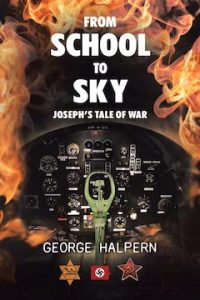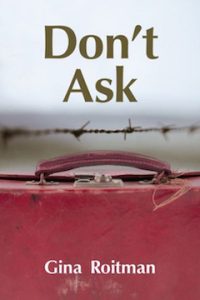Heroism and survival took on new meaning for me after reading George Halpern’s From School to Sky: Joseph’s Tale of War and Gina Roitman’s Don’t Ask. The first is a biography of a certain time in Halpern’s father’s life, the latter is a fictional work that centres around a daughter’s search for her mother’s history during that same time period, the Second World War. Both books are featured at this year’s Cherie Smith JCC Jewish Book Festival.
Halpern takes part in the Feb. 12, 10 a.m., by-donation event A Literary Quickie, in which he and seven other authors each have five minutes to pitch their books. Roitman appears with Lynda Cohen Loigman (The Matchmaker’s Gift: A Novel) in A Day to Celebrate Human Closeness, which takes place at 2 p.m., on Feb. 14 ($18).
 Halpern’s pitch to me included only some of the actions that make his father, Joseph Halpern, a hero. In reading the book, which is based on months’ worth of interviews George did with his dad, who died in 2011, I discovered several more reasons. Joseph was a fighter pilot for the Russian Air Force (Joseph’s town, Vladimir Volynsky, was in the part of Poland annexed by the Soviet Union weeks after the war started). He was a Soviet prisoner for a spell, then trained as a special forces commando. He was captured by Nazis on a mission, but escaped. Following the war, he defected (to the Americans in Berlin), taking his Russian plane with him, but then returned to Russia to fulfil a promise he made to someone who had saved his life. He founded an orphanage, helped create the Israeli Air Force, etc., etc.
Halpern’s pitch to me included only some of the actions that make his father, Joseph Halpern, a hero. In reading the book, which is based on months’ worth of interviews George did with his dad, who died in 2011, I discovered several more reasons. Joseph was a fighter pilot for the Russian Air Force (Joseph’s town, Vladimir Volynsky, was in the part of Poland annexed by the Soviet Union weeks after the war started). He was a Soviet prisoner for a spell, then trained as a special forces commando. He was captured by Nazis on a mission, but escaped. Following the war, he defected (to the Americans in Berlin), taking his Russian plane with him, but then returned to Russia to fulfil a promise he made to someone who had saved his life. He founded an orphanage, helped create the Israeli Air Force, etc., etc.
The most compelling part to me of Joseph Halpern’s story, however, is his honest appraisal of himself, his humility and his humanity, even though he wasn’t always humane. He admits his “fearless attitude would be combined with special training – including brainwashing – and I would truly believe that I was invincible.” He is open about wanting to have killed more Nazis than he did, and that he personally killed someone in an act of revenge. His complexities include the life he had to build after immigrating to Canada, caring for his kids through his wife’s struggle with mental illness, obtaining two doctorates, working with NASA, finding love again and more.
Similarly, though in a fictional setting, Roitman’s novel deals with multi-layered human beings, some of whom survive because they committed acts of which they are not proud – and they carry the guilt for the rest of their lives. As Joseph’s trauma travels beyond his own self and is passed on in some degree to his children, so does the character Rokhl’s carry over to her daughter Hannah.
Rokhl doesn’t talk much, and certainly not about her experiences during the Holocaust, in contrast to her husband, who has already passed away when the novel begins – what little Hannah knows of her heritage has come from her father. Hannah only receives her mother’s wisdom through notes that Rokhl leaves her, the last of which Hannah finds in her mom’s purse after Rokhl dies, apparently by suicide: “I am not her,” it says.
 Don’t Ask traces Hannah’s attempt to figure out the mystery of that note and deal with the grief of her mother’s death, while also brokering a real estate deal between a German buyer and a Holocaust survivor who lives in Quebec and owns a tract of land in the Laurentians. Hannah’s parents immigrated to Montreal after the war; Hannah, their only child, was born in a DP camp in Germany, which they had called home. Since the Holocaust, “Her father could not say the word ‘German’ without spitting” and, in her last encounter with her mother, in which Hannah shared the news that she was traveling to Germany, her mother had threatened, “If you go, it will be over my dead body, do you hear me?”
Don’t Ask traces Hannah’s attempt to figure out the mystery of that note and deal with the grief of her mother’s death, while also brokering a real estate deal between a German buyer and a Holocaust survivor who lives in Quebec and owns a tract of land in the Laurentians. Hannah’s parents immigrated to Montreal after the war; Hannah, their only child, was born in a DP camp in Germany, which they had called home. Since the Holocaust, “Her father could not say the word ‘German’ without spitting” and, in her last encounter with her mother, in which Hannah shared the news that she was traveling to Germany, her mother had threatened, “If you go, it will be over my dead body, do you hear me?”
In the guise of a budding romance between Hannah and Max, her counterpart in Germany, Roitman addresses many challenging questions about the intergenerational nature of culpability and forgiveness, of duty to one’s parents and the responsibility for building one’s own life, of nursing hatred or risking love. She does so in a fashion that sometimes pushes belief – for example, Hannah and Max are not young, yet they lack much understanding of what attraction is, and Hannah, despite her professed curiosity about her mother’s past doesn’t explore until the end of the book four boxes of her mother’s notes, which have sat in her closet for an undisclosed amount of time prior to her mother’s death. Yet, Roitman also writes in a way that makes you care about the characters and what happens to them. The story of Rokhl’s Holocaust experiences and that of Hannah’s budding relationship (and the weight of history that it and the real estate deal unearth) are enthralling and Don’t Ask is a hard book to put down until you finish it.
